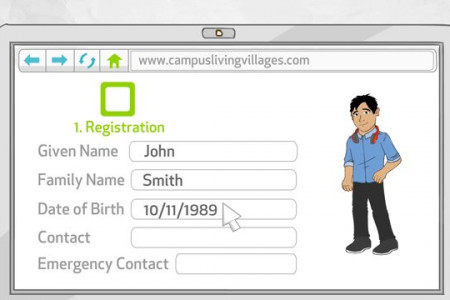
How Has Online Learning Changed Education?
HOW THE INTERNET IS REVOLUTIONIZING EDUCATION The Internet has transformed education dramatically, and in a very funda- mental way: the grasp of power has shifted from the hands of the institution to those of the student. Whether enrolled at your local university or simply looking to deepen your knowledge of a subject, the options for education have never been more diverse. Education is more accessible than ever before in human history, thanks entirely to the Internet. MILESTONES IN E-LEARNING 1971 The Open University opens in England with an open admissions policy, and begins broadcasting lectures on television. 25,000 1989 students enroll. University of Phoenix launches its private, for-profit online school 12 students enroll. 1993 Criteria is created by pioneer William Graziadei III, Ph.D: e-learning systems must be easy to use, portable, replicable, scalable, and affordable. 1999 @? @! The term 'e-Learning is coined at an educational seminar. 2004 5X5 = 25 5X6 = 30 Salman Khan records instructional YouTube videos to help his cousins with math. The rising popularity of these videos leads him to found the Khan Academy, a not-for-profit, free, online educational organization. And not everyone is in it for the money: for-profit and non-profit institutions alike are revolutionizing the way we learn. ONLINE EDUCATION IS A $34 BILLION INDUSTRY. CURRENTLY The Open University teaches a majority of its courses online. At 250,000 students, it is the UK's largest university. The Open University That's twice the size of = 10,000 students the University of London. University of Phoenix The for-profit University of Phoenix is now the largest university in the US, enrolling more than 500,000 students. It is 13 times larger than the University of Arizona. = 10,000 students Khan Academy With grants from The Gates Foundation and Google, Salman Khan has recorded over 2,100 lecture videos, which have been viewed over 41 million times. = 100 lecture videos That's the number of views they would receive if every student in America viewed one once. =1 million views THE INTERNET IS CHANGING HOW WE LEARN (Vs TRADITIONAL INDIVIDUAL Traditional educational institutions and E-learning organizations alike are transforming the ways we are learning in today's society. From traditional institutions shifting classroom settings online, to new-era organizations offering a whole new way of learning for free, here's a look at how the Internet has enabled this revolution. There are 25,000 online courses There are currently 3 million online-only students in the US. offered in the Us. That's more than the total number of college students in France. TRADITIONAL Almost half of college students There have been over 1 million K-12 enrollments in online courses. take at least one class online. Nearly half of online students are 26 or older. Online educa- 67% of colleges HELVETICA are unable to meet tion is opening doors to more people. demand for online courses. 75% of public higher learning institutions have online learning in their long-term plans. By 2019, it is estimated that 50% of all classes taught will be delivered online, and many of these will be available for free. Thanks to the Internet, students have more power over their college USE OF ONLINE EDUCATION HAS BEEN GROWING AT AN ASTRONOMICAL RATE, AND IT ISN'T STOPPING. educations than ever before. The Khan Model: KHAN Students learn at ACADEMY their own pace, in their own time. INDIVIDUAL -No more one-size-fits-all lectures. iTunes U offers more than -Reversing the model: learn at home, work in class 350,000 college lectures and videos from more than 800 universities including Stanford, Yale, and Oxford, all for free. -What does Bill Gates think? "The future of education" -1 million students per month Last year, The London School of Business and Finance launched the Global M. B. A. delivered "Schools app': Bill Gates donated $2 million towards development of facebook app to help college students stay in school. entirely through a facebook app. But today, due to the Internet's transformative power, students can custom-design their own educations in what- ever way they see fit. Higher education is no longer only for the elite; anyone with an Internet connection can educate themselves. Access to education has never been more comprehensive or more democratic, and it's only going to get better. The idea of "no child left behind" may, in the coming years, truly become a reality. THE OLD MODEL OF EDUCATION FORCED EVERY STUDENT THROUGH THE SAME, EXPENSIVE MOLD. Created by: www.OnlineEducation.net SOURCES: Ambient Insight Research (2009) US Self-paced e-Learning Market Monroe WA: Ambient Insight Research http://tools.ietf.org/html/rfc675 http://horizon.unc.edu/projects/monograph/CD/Technological http://www.phoenix.edu/about us/about university of Tools/Graziadei.html .html http://www.khanacademy.org/about/faq#started w8.open.ac.ukvalesticostarted/distane lemint-1010myths etecalechools. http://www. http://www.leerbeleving.nl/wbts/1/history_of_elearning.html http://chronicle. http://chronicle.com/blogswiredeampusienrollmUnline-L 125202/ 5-at-the-highest-rate-ever/28204 http://nces.ed.gov/pubs2010/2010347.pdf http://campustechnology.c http://www.hesa.ac.ukidoridata009/10 d itiers/g Auestitution0809 xlszy0 classes-online-by-2014.aspx This work is licensed under a Creative Commons License. BY NO NO 个 ..... 00
How Has Online Learning Changed Education?
Source
Unknown. Add a sourceCategory
EducationGet a Quote











